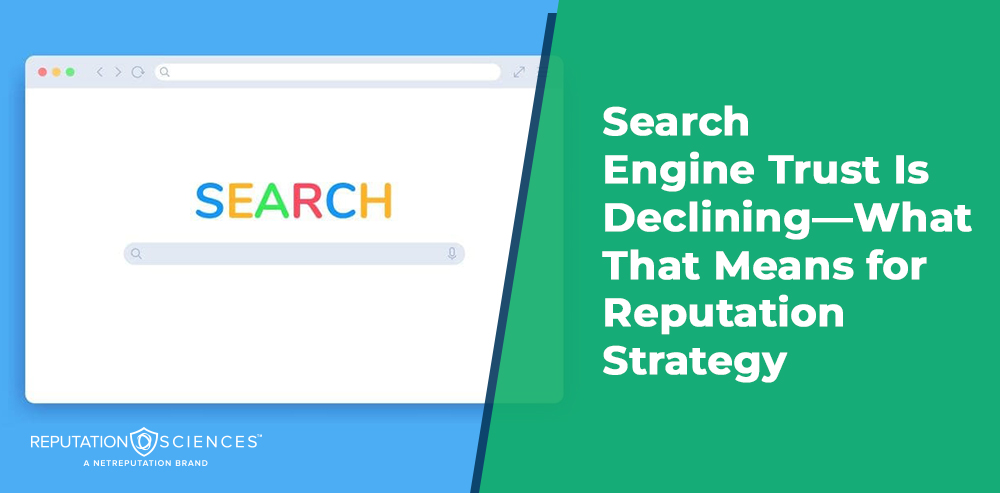Search Engine Trust Is Declining—What That Means for Reputation Strategy

Search engines are no longer neutral gateways to information. Instead, they play a decisive role in shaping how brands are perceived. With declining trust in search engine results, reputation strategy has never been more important. Consumers expect brands to maintain a positive online presence and respond promptly to feedback. But what happens when the platform people rely on to form opinions is losing credibility itself?
Why Search Engine Trust Is Declining
Several recent studies and industry trends have revealed a growing skepticism among users toward search engines. Issues such as the rise of fake reviews, SEO manipulation, and paid content ranking higher than relevant results are eroding user confidence.
When consumers search for information, they expect to receive accurate and unbiased results. However, increasingly, they’re met with conflicting sources, low-quality content, or brand mentions that are outdated or untrustworthy. This undermines the very foundation of search engines and damages user trust.
For companies, this means search engine results are no longer a reliable reflection of their brand’s reputation. Even with a solid online reputation management plan, a brand’s visibility can suffer due to algorithmic bias, spammy content from competitors, or unverified user-generated content.
The Reputation Strategy Shift
As search engine credibility weakens, businesses must evolve their reputation management strategies. Today’s reputation strategy involves much more than suppressing negative reviews or promoting positive content. It requires a proactive, multi-channel approach that prioritizes authenticity, transparency, and consistency.
Brands need to build a strong reputation management strategy that doesn’t rely solely on search engines. This means:
- Creating a robust presence across social media platforms
- Encouraging and amplifying positive online reviews
- Responding promptly to negative feedback
- Using reputation management software and social listening tools to monitor brand perception in real time
Key Elements of an Effective Reputation Management Strategy
- Customer Feedback Loops: Online reviews—positive and negative—are central to your brand’s online reputation. By responding to negative reviews promptly and professionally, you not only retain existing customers but also demonstrate to potential customers that your business takes accountability seriously. Encourage satisfied customers to leave positive reviews to balance public perception and build a loyal customer base.
- Consistent Brand Voice Across Platforms: A strong social media presence with consistent messaging strengthens your brand image. Whether it’s your website, blog, or social media accounts, make sure your messaging aligns with your brand values. Consumers expect brands to maintain continuity across channels.
- Own Your Content: Don’t let search engines and review sites define your narrative. Proactively publish blogs, FAQs, videos, and customer success stories to shape brand perception. This also helps push down negative content in search engine results while increasing brand awareness.
- Utilize Reputation Management Tools: A good reputation management tool allows you to track key metrics, manage customer feedback, and automate responses. These tools are essential for local businesses that receive high volumes of reviews across multiple platforms.
- Engage in Social Listening: Utilize social listening tools to stay informed about shifts in brand perception. By identifying issues early, you can address customer complaints before they escalate and implement a crisis management plan if needed.
Why It Matters for SEO and Customer Experience
Search engine rankings may still matter, but they’re no longer the sole measure of success. A business reputation management plan must now consider customer experience, employee satisfaction, and how well the brand adapts to feedback.
Search engines take signals from online reviews, social media engagement, and even brand mentions on authoritative websites. If your online presence is strong across these channels, your business stands a better chance of appearing credible, regardless of the algorithm’s current behavior.
This means:
- Happy customers = more positive brand associations
- Positive brand reputation = more visibility and engagement
- Excellent customer service = fewer negative online reviews
It’s all interconnected, and failing in one area can drag down your entire brand’s online reputation.
The Cost of Doing Nothing
Ignoring a decline in search engine trust and sticking to outdated marketing efforts can be costly. A poor reputation or negative comments left unaddressed can lead to:
- A decline in customer loyalty
- Higher churn from dissatisfied customers
- Increased risk of negative reputation spreading online
- Difficulty attracting new customers
In some industries, particularly those where trust and security are paramount, such as healthcare or finance, a negative online reputation can lead to legal issues or lost revenue.
Building Long-Term Trust Through Reputation Management
Rather than reacting to negative feedback, invest in a reputation management strategy that protects your brand from future disruptions. This includes:
- Cultivating a positive image through authentic interactions
- Empowering employees to be brand advocates
- Using business reputation management tools to stay agile
Ultimately, the most effective reputation management strategy blends technology with human insight. Companies that integrate customer data, online reputation management tools, and proactive outreach will thrive even as search engine trust declines.
Conclusion: Your Reputation Strategy Needs to Evolve
Search engines may no longer be the gold standard for truth, but your reputation strategy still needs to meet consumer expectations. In a world where brand perception can shift overnight, effective reputation management is your most powerful asset.
The brands that will win the future are the ones investing in transparency, customer satisfaction, and brand visibility beyond just Google. Now is the time to take control of your online reputation, strengthen your presence across platforms, and build a foundation that outlasts algorithm changes.
Reputation isn’t what shows up on search engines—it’s what sticks with people long after the search ends.
